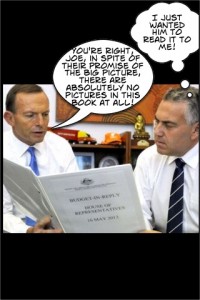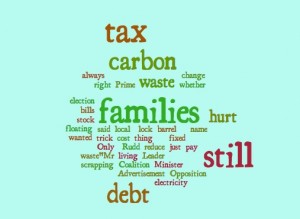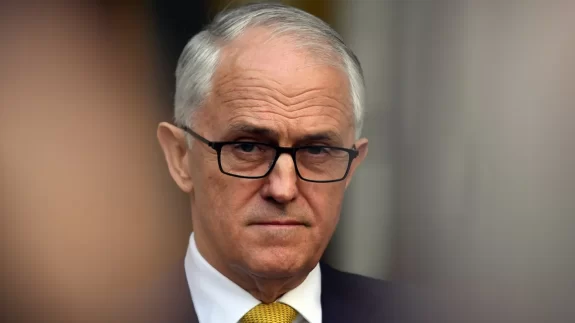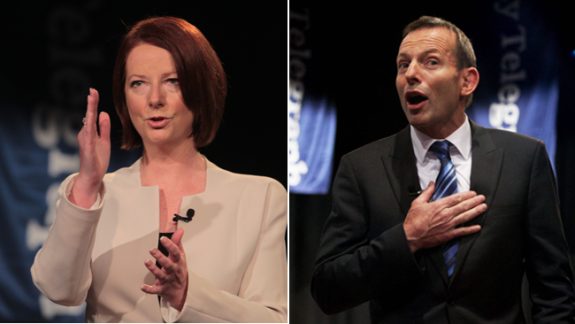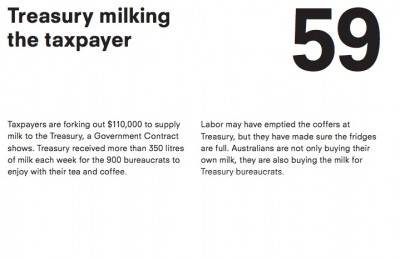Amanda Vanstone, “Illegals” and the stampede of elephants

A few weeks ago, I talked about The Elephant in The Room in relation to the lack of women in Abbott’s Cabinet. The idea of the elephant in the room is, of course, something very obvious which nobody seems to be mentioning. Well, I’m beginning to think that before Abbott’s term is over, we’ll have such a large herd that we can start making piano keys out of ivory again.
Let’s start with Joe Hockey’s comment on Wednesday.
Well that’s because Labor created the debt. It’d be the height of hypocrisy for the Labor Party which started the fires in relation to the debt, to complain about us trying to stop the fires, to start to pay down the debt, to start to back-burn and get back to surplus.
Adam Bandt was attacked for trying to link the bushfires to climate change. Yet here we have Hockey trying to link the ALP to the fires and I haven’t noticed any criticism. Or aren’t we meant to draw any link between the NSW fires and his metaphor? Is it just an unfortunate coincidence that there happened to be bushfires and Hockey had forgotten all about it? Or was it a deliberate, pusillanimous statement from a man who now wants to distract us all from his “budget emergency” rhetoric. Back-burning? Next we’ll hear that a rise in unemployment is because the economy is doing so well that more people are seeking work!
Then we have Scott Morrison’s determination to have asylum seekers referred to as “illegals”.
Now, for just one second, I’d like to accept Scott Morrison on his word, because being a Christian, I know that he wouldn’t be deliberately lying. After al,l in this article from Misha Schubert on February 15, 2008, he declares his views on “righteousness”, which surely would mean a reluctance to lie.
“Declaring his faith was not a political agenda, he said it would, however, shape his political agenda based on values of kindness, justice and righteousness.”
The Liberals often present themselves as being tough on “law and order”. Yet apart from some time in “remand” (the detention centres), not one of these asylum seekers has been charged with a crime. Yet – we’re told – they have entered the country “illegally”. Why are they not being charged with this “crime”.
It seems strange to me. Surely, if they’ve done something illegal, there should be charges. Perhaps someone should ask Morrison about this failure of our justice system. After all, he does say his political agenda is based on justice. But he also says it’s based on kindness, so perhaps he’s just confused.
As for the committee of audit, there have been some eyes raised at the inclusion of Amanda Vanstone and querying her qualifications to be there. (She does have a column in a newspaper, and as Andrew Bolt will assure you, that makes you an expert on everything!) So let’s have a look at Vanstone’s career.
Prior to politics, she attained both Law and Arts degrees, and further qualifications in Legal Practice and a Marketing Studies Certificate, and she was as a retailer in a large department store. She ran her own business selling prints and pictures frames, before working as a legal practitioner.
As a politician, she held numerous portfolios none of which where in Treasury or Finance. But she was Minister Assisting the Prime Minister for the Status of Women. Her achievements as a minister included abolishing Aboriginal and Torres Strait Islander Commission (ATSIC). As Immigration Minister, she was showed her humane side by overturning a deportation order and granting a visa to Francesco Madafferi, in spite of alleged criminal connections, and, in spite of alleged donations to the Liberal Party from members of his family. She was twice dropped from Howard’s cabinet. But she did show her creative side in February 2007 with Under Southern Stars.
So why would Amanda Vanstone be chosen to be on the Commission of Audit? Well, when she was Minister for Family and Community Services, her opposite, Wayne Swan described her as “a political hyena who takes delight in attacking society’s most vulnerable”. And this audit commission certainly needs someone with that sort of expertise in looking at Centrelink.
As for the inclusion of Peter Boxall, you might find this quote from an interview with him which appeared in The Canberra Times in 2006 instructive:
Asked if in cutting the first deficit there was anything that caused him anguish, he says, “No. I don’t recall actually. It was quite interesting that the public service didn’t seem well prepared for it and a lot of it was driven by the new ministers.” In doing this he says they met resistance, including from central agencies. He agrees that he has wielded the knife for a fair bit of his career and, when asked if he prefers this to doling out money he says, “I would not prefer to be doling out money because I have great respect for taxpayers’ money and I don’t like supporting programs which I don’t think are good value for the taxpayer.”
I guess it reminds me of “Yes, Minister.”
Minister, two basic rules of government: Never look into anything you don’t have to. And never set up an enquiry unless you know in advance what its findings will be.’
Let me just cautiously predict the Audit Commission will recommend selling Medibank Private, Australia Post and one of two other things. It will also find that the Government needs to cut spending in some sensitive areas. It will not use the words “cut spending” preferring to talk about “eliminating waste”. Hockey will say this means that we need to be harsh in the Budget, but it’s Labor’s fault.
I also predict that the “back-burning” may get out of control.
Like what we do at The AIMN?
You’ll like it even more knowing that your donation will help us to keep up the good fight.
Chuck in a few bucks and see just how far it goes!
Your contribution to help with the running costs of this site will be gratefully accepted.
You can donate through PayPal or credit card via the button below, or donate via bank transfer: BSB: 062500; A/c no: 10495969










